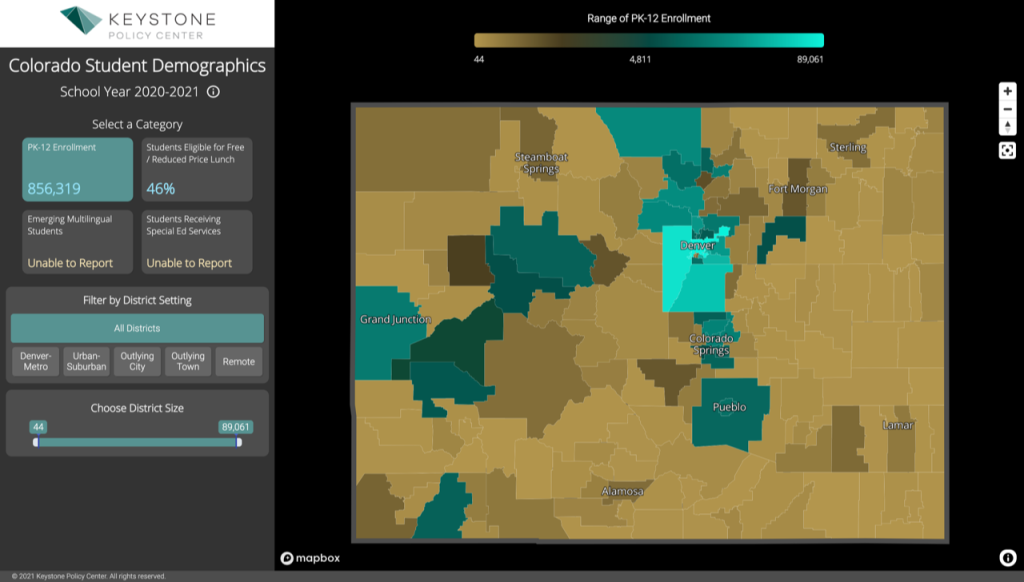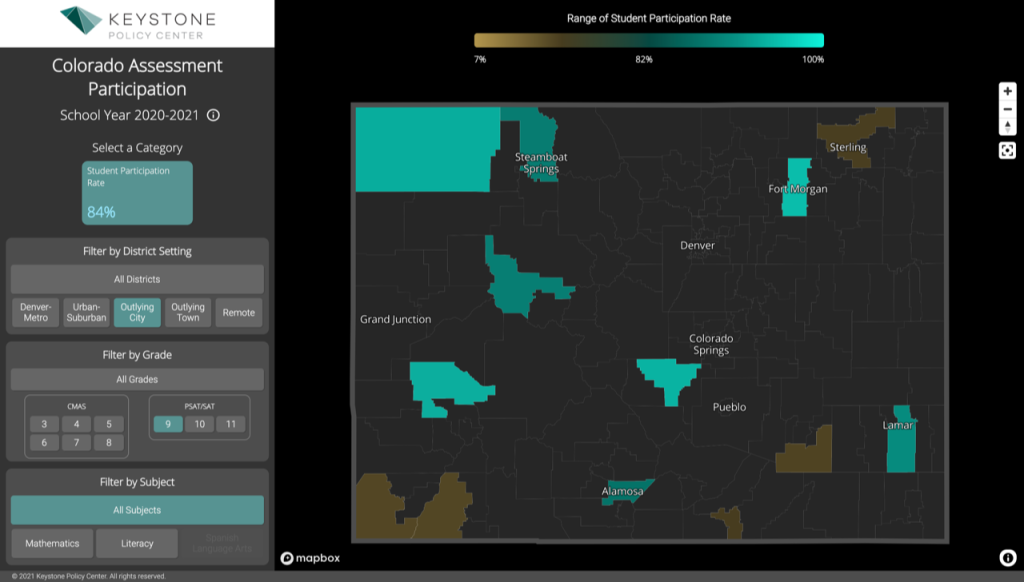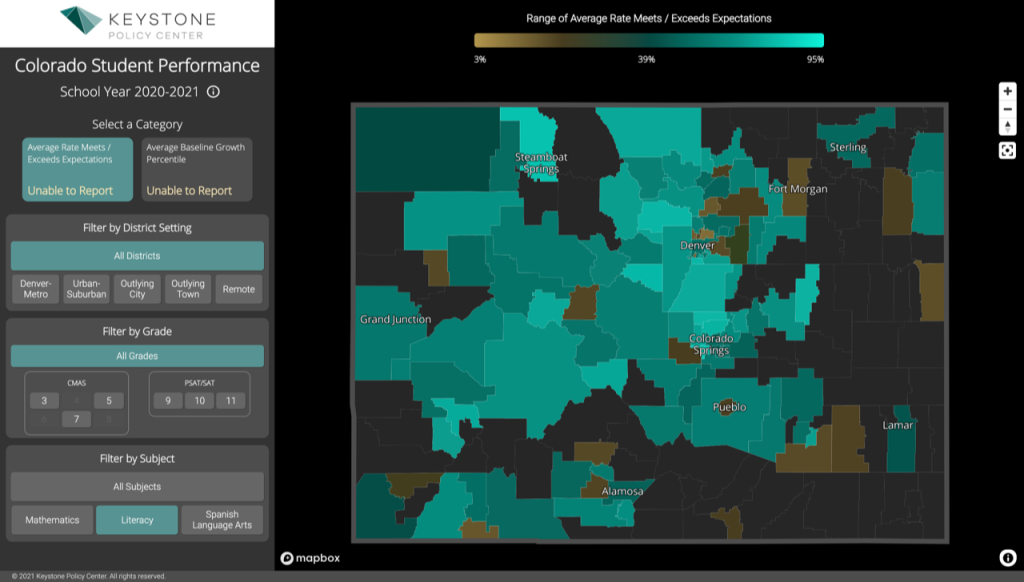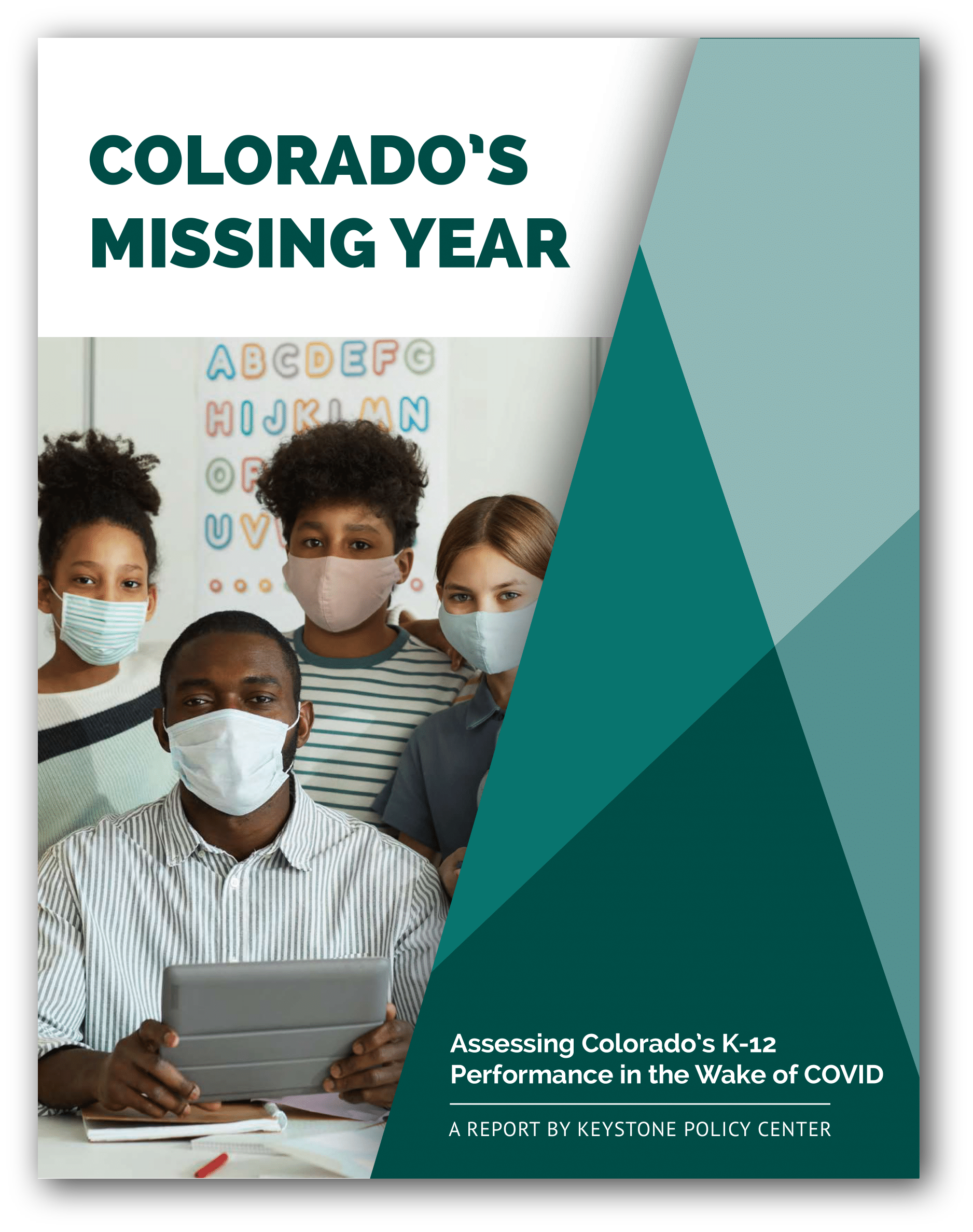Colorado’s Missing Year
In October 2021, the Keystone Policy Center released a report titled Colorado’s Missing Year analyzing data on Colorado education during the pandemic, which revealed critical gaps in student learning across the state but also indicated potential bright spots. The data paints a revealing picture of student participation and achievement during the pandemic.
For students worldwide, the 2020-2021 school year was arguably the most disruptive and difficult schooling experience for students, parents and educators in modern times. This included Colorado where student well-being and achievement has been dramatically impacted by the pandemic. While there is somewhat limited publicly available data, there remains much in the data that can and should be used to inform state education policy and practice. The data shows that there are critical gaps in student learning across the state that must be addressed, as well as some bright spots. Some key takeaways, covered in more detail throughout the report, include:
- There was a substantive decline in assessment participation rates across the state combined with high variability in participation rates with ranges from below 10% to multiple districts with 100% participation.
- There were fewer assessments given in 2021 so there was accordingly less assessment data overall when compared to earlier years.
- Statewide 5th grade literacy performance declined slightly, from 48.4% of students meeting or exceeding expectations in 2019 to 47.2% of students in 2021. The statewide declines in 4th grade math were far greater, from 35.7% in 2019 to 28.5% in 2021.
- While it is challenging to compare SAT performance from 2019 to 2021, as 2019 performance data was reported differently than prior years, 11th grade SAT scores increased from 2019 to 2021 with 60% of 11th graders meeting or exceeding expectations in literacy and 36.4% in math.
- Math performance continues to lag literacy performance at all education levels and must be a focus for future improvements to programming.
- Performance continues to correlate with student demographics, although the level of correlation varies dramatically across geographies, grade levels and subjects.
Many states, including Colorado, have paused state accountability which has in some cases limited the public data available. While other researchers have stepped in to address this gap, it is essential that governmental agencies continue to be trusted sources for information on both program offerings and student outcomes, both academic and otherwise. This report details how these national themes have played out in Colorado as a single use case and analyzes the impact on student learning as measured by the state mandated assessments, the Colorado Measures of Academic Standards, and Colorado PSAT and SAT.
Colorado’s Missing Year: Charter School Performance
In February 2022, Keystone Policy Center released its second report analyzing public data to assess the impact the COVID-19 disruption had on Colorado education. Entitled Colorado’s Missing Year: Charter School Performance, the report explores recent enrollment and academic performance data to examine how charter schools fared relative to the state and other school district managed public schools in the wake of the COVID-19 pandemic.
The charter school report analyzes school enrollment trends, student participation in academic assessments, student academic performance, and academic growth. Among the key findings included in the report are:
- The percent of Colorado students enrolled in charter schools continues to grow, and charter schools saw increases in student enrollment during COVID-19 despite large declines in overall enrollment in public schools generally in the state.
- On average, charter schools had higher rates of student participation on statewide assessments of academic performance in Literacy and Math in the most recent year.
- On those assessments, charter schools had higher proficiency rates than district-run schools statewide and the majority of charter schools also outperformed their district average, consistent with historic performance trends.
- While demographics are associated with proficiency rates for all schools, the relationship between school demographics and assessment performance is weaker in charter schools than in district managed schools.
- Academic growth in charter schools, as in district-run schools, varies widely by grade and subject area in 2020-21 and should be considered with caution at the school level.
Listen to the following episode of the Keynotes Podcast highlighting the Colorado’s Missing Year report.
Keystone Policy Center has also published a set of interactive maps available below detailing the district-by-district student performance, participation, and demographics based on the data in the reports.
Demographics Map

Participation Map

Performance Map





 Effective March 1, 2025, Thomas J. Vilsack, former United States Secretary of Agriculture and Governor of Iowa, became the first Chief Executive Officer for the World Food Prize Foundation. In this new role, Governor Vilsack is focusing on expanding the Foundation’s global network, and will further position the Foundation as a leader in addressing global food and nutrition insecurity, continuing his lifetime of public service.
Effective March 1, 2025, Thomas J. Vilsack, former United States Secretary of Agriculture and Governor of Iowa, became the first Chief Executive Officer for the World Food Prize Foundation. In this new role, Governor Vilsack is focusing on expanding the Foundation’s global network, and will further position the Foundation as a leader in addressing global food and nutrition insecurity, continuing his lifetime of public service. Shelby Coffey III is a distinguished journalist, media executive, and thought leader whose career has helped shape the landscape of American news and public discourse. Over several decades, Coffey has held some of the most influential roles in journalism, including serving as editor of the Los Angeles Times, executive vice president of ABC News, and deputy managing editor of The Washington Post. His editorial leadership extended to key roles as president of CNN Financial News, editor of the Dallas Times Herald, and U.S. News & World Report.
Shelby Coffey III is a distinguished journalist, media executive, and thought leader whose career has helped shape the landscape of American news and public discourse. Over several decades, Coffey has held some of the most influential roles in journalism, including serving as editor of the Los Angeles Times, executive vice president of ABC News, and deputy managing editor of The Washington Post. His editorial leadership extended to key roles as president of CNN Financial News, editor of the Dallas Times Herald, and U.S. News & World Report. Jerry Steiner has spent 40 years involved in agriculture following growing up on a Wisconsin dairy farm. He began his career with Monsanto, in multiple business leadership roles. From 2003-2013 he served as a member of the Executive team, as the company’s Executive Vice President of Sustainability and Corporate Affairs. He led the company’s global Government, Public and Industry Affairs teams across the 70 countries where Monsanto conducts business. This experience got Jerry connected to the Keystones centers work in agriculture. Key among his responsibilities were shaping the company’s public policy and building partnerships aimed at helping farmers around the world produce more food, while conserving valuable resources like water and energy. Two unique partnership that developed under his leadership were drought tolerant corn with 5 African countries, CIMMYT and the Gates foundation, and a building a sustainable business model in Brazil with the value chain leading to significant multi-company investment and soybean varieties that can protected themselves.
Jerry Steiner has spent 40 years involved in agriculture following growing up on a Wisconsin dairy farm. He began his career with Monsanto, in multiple business leadership roles. From 2003-2013 he served as a member of the Executive team, as the company’s Executive Vice President of Sustainability and Corporate Affairs. He led the company’s global Government, Public and Industry Affairs teams across the 70 countries where Monsanto conducts business. This experience got Jerry connected to the Keystones centers work in agriculture. Key among his responsibilities were shaping the company’s public policy and building partnerships aimed at helping farmers around the world produce more food, while conserving valuable resources like water and energy. Two unique partnership that developed under his leadership were drought tolerant corn with 5 African countries, CIMMYT and the Gates foundation, and a building a sustainable business model in Brazil with the value chain leading to significant multi-company investment and soybean varieties that can protected themselves. Jennifer Morris is the Chief Executive Officer of The Nature Conservancy, leading a team of nearly 6,000 staff working in more than 80 countries and territories tackling the dual crises of the
Jennifer Morris is the Chief Executive Officer of The Nature Conservancy, leading a team of nearly 6,000 staff working in more than 80 countries and territories tackling the dual crises of the  Congressman Joe Neguse represents Colorado’s 2nd District in the U.S. House of Representatives. He was elected to his first term in November 2018, becoming the first Black Member of Congress in Colorado history. In December 2022, Rep. Neguse was elected by his colleagues to serve as Chair of the Democratic Policy and Communications Committee (DPCC), becoming the first Coloradan to serve in a senior elected leadership role in the House in over 85 years. He serves on the Natural Resources and Judiciary Committees, and was also appointed by House Minority Leader Hakeem Jeffries to serve as one of four Democrats on the prestigious Rules Committee. Rep. Neguse serves as Ranking Member on the House Subcommittee on Federal Lands, which he previously Chaired in the 117th Congress.
Congressman Joe Neguse represents Colorado’s 2nd District in the U.S. House of Representatives. He was elected to his first term in November 2018, becoming the first Black Member of Congress in Colorado history. In December 2022, Rep. Neguse was elected by his colleagues to serve as Chair of the Democratic Policy and Communications Committee (DPCC), becoming the first Coloradan to serve in a senior elected leadership role in the House in over 85 years. He serves on the Natural Resources and Judiciary Committees, and was also appointed by House Minority Leader Hakeem Jeffries to serve as one of four Democrats on the prestigious Rules Committee. Rep. Neguse serves as Ranking Member on the House Subcommittee on Federal Lands, which he previously Chaired in the 117th Congress. Llewellyn King was born in Southern Rhodesia, now Zimbabwe. He went into journalism as soon as he turned 16, stringing for Time magazine and United Press in Africa.
Llewellyn King was born in Southern Rhodesia, now Zimbabwe. He went into journalism as soon as he turned 16, stringing for Time magazine and United Press in Africa. Steven Williams is the Chief Executive Officer of PepsiCo North America, overseeing a more than $48 billion business that spans PepsiCo’s Foods and Beverage operating units. His leadership encompasses more than 125,000 associates and over 900 locations across the U.S. and Canada. Steven joined PepsiCo in 2001 as part of PepsiCo’s acquisition of the Quaker Oats Company, which he joined in 1997, and has held leadership positions of increased responsibility since.
Steven Williams is the Chief Executive Officer of PepsiCo North America, overseeing a more than $48 billion business that spans PepsiCo’s Foods and Beverage operating units. His leadership encompasses more than 125,000 associates and over 900 locations across the U.S. and Canada. Steven joined PepsiCo in 2001 as part of PepsiCo’s acquisition of the Quaker Oats Company, which he joined in 1997, and has held leadership positions of increased responsibility since.